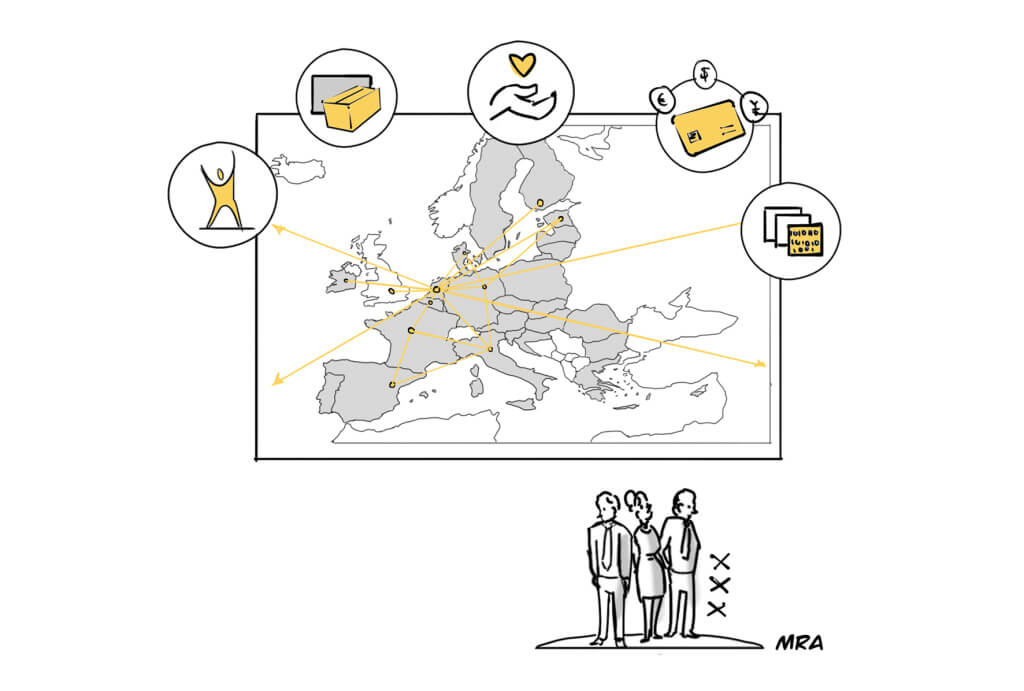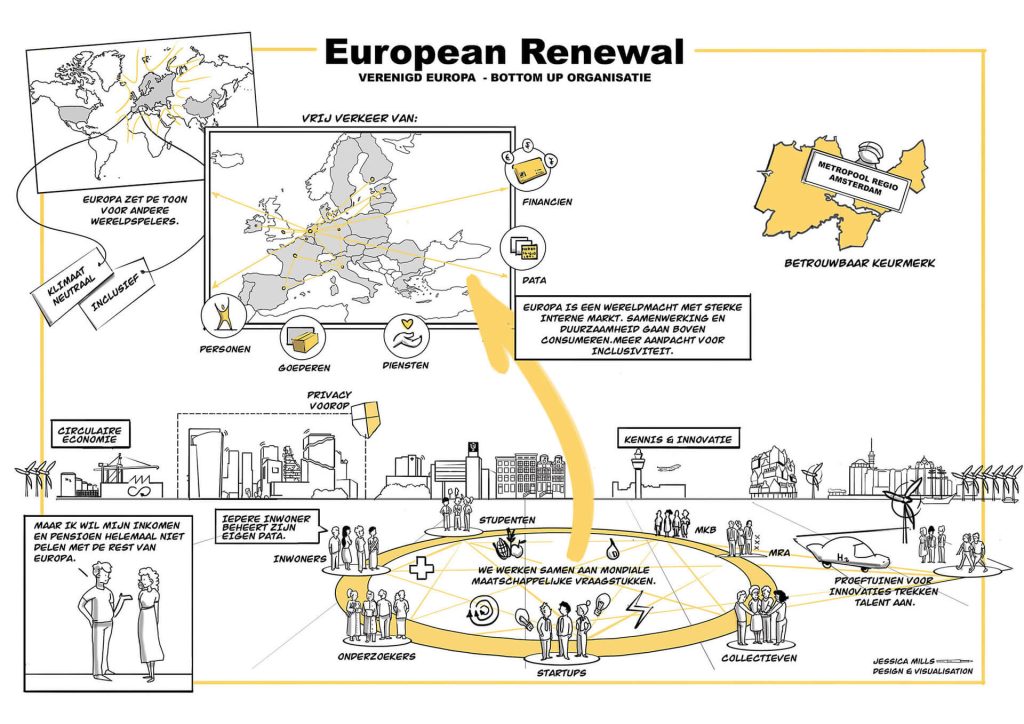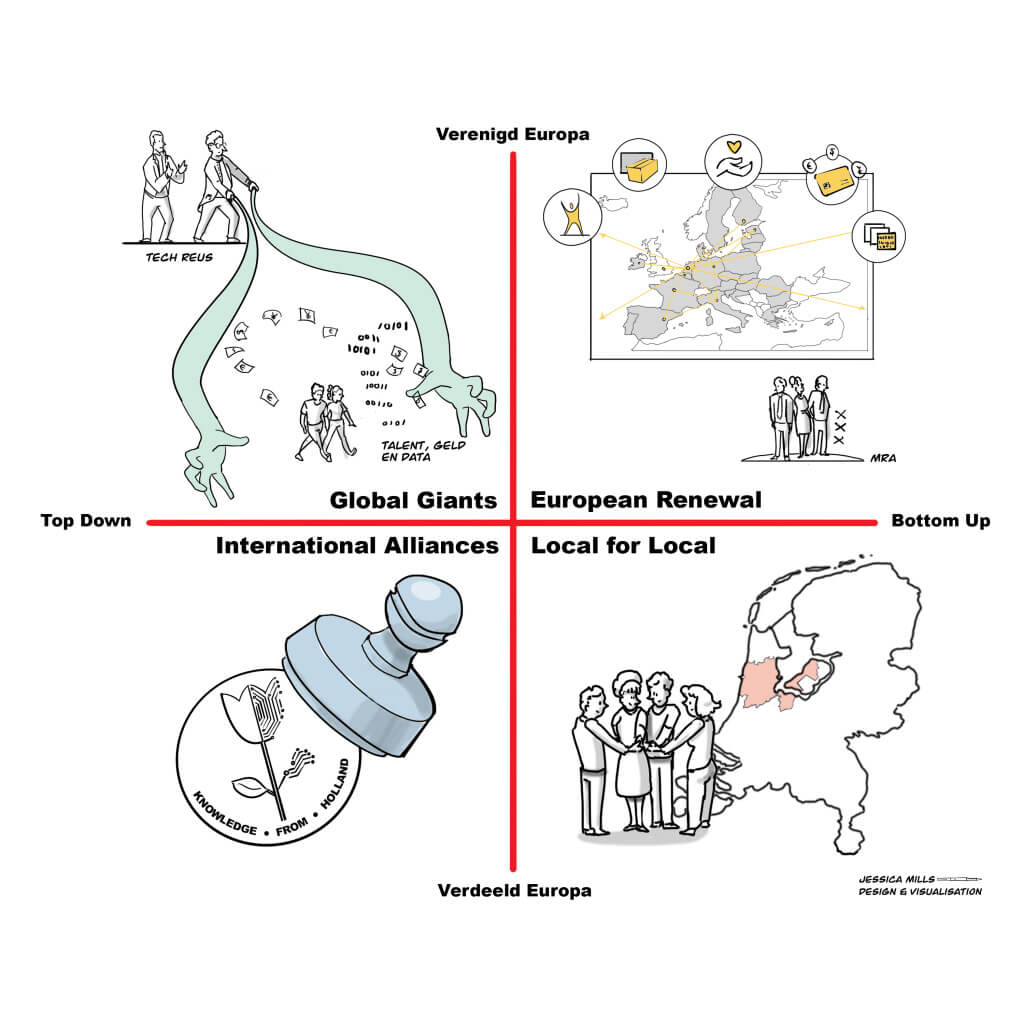Scenario: European Renewal
The European Renewal scenario represents a world in which a united Europe stimulates an economy and society organised from the bottom up. In this scenario, national governments have limited influence, residents’ collectives take the initiative themselves, and municipalities and regions make a lot of decisions for themselves.
This scenario was last updated on 9 June 2020.

The keywords in this scenario:
- Cooperation
- Harmonisation and standardisation
- Open borders within Europe
- Enterprising/participating residents
- Local sharing concepts
- Network economy
Below you can see our illustration for discussion for the European Renewal scenario (click on this link for a larger image). Each scenario has one of these illustrations (there are links to the other three scenarios at the bottom of this article) visualising the important aspects of each scenario and the differences between them. In combination with the text below, this gives a quick impression of the world that each scenario envisages.

United Europe, bottom-up control
Stakeholder value and connection are central
It is 2040. Globalisation has continued, but its character has radically altered. The time of competition and protectionism is behind us, connection and cooperation are central. Although Europe tries to position itself as a great power between China and the United States by means of a distinctive internal market with a climate neutral and social focus, it regularly loses out on the global playing field. It is not so much countries or governments but rather networks of companies and residents that are more closely connected and jointly seek solutions to achieve prosperity and well-being. They also devote attention to the major social and climatological challenges of the time.
Brussels and citizens reinforce one another…
Europe has successfully responded to the changing zeitgeist and has established the preconditions that are needed. With the European Green Deal, a green industrial policy has been initiated and both citizens and companies are encouraged to become more sustainable. The internal market is still relatively free, but Europe does set strict conditions, with a mandate from its citizens. The market power of large companies is tightly regulated, and strict requirements are set for data processing and digital services. Privacy by design is generally accepted. This offers space for smaller players, experts and collectives to arrange things in their own way. Local authorities are fully involved. Networks are sometimes connected geographically, but just as often they are thematic. Cooperation in Europe is also necessary to ensure resilience to disasters and other external factors. A wide variety of parties, supported by the EU, collaborate in diversified and robust supply chains, with a focus on the reliable availability close to home of important goods, healthcare, and essential services. Banks and pension funds are now investing in demand-driven green companies. The supply-driven, volatile oil market is a thing of the past.
… and together drive innovative, sustainable alternatives
At the same time, Europe stimulates technological progress with an ambitious, mission-driven innovation agenda. These missions are chosen in consultation with the public and therefore focus on major social issues such as energy, raw materials and health. The harmonisation of regulations and the commitment to open data markets accelerate innovation. The internal European borders are open for talent and goods. There is a strong rail and road network linking European cities. Flying is only accepted over distances that are too great to cover quickly enough by train or fossil-free private vehicle. Due to the rapid rise of remote working, education and business, much less travel is necessary.
In this scenario, new technologies are developed by collectives and small players taking an open-source approach. By keeping these open-source goods and services simple and using materials and components that are readily available locally, cost-efficient customisation is possible. Investments are also on a smaller scale and are often made by several parties jointly. The goods and services can be customised through a strong connection with the ultimate user groups. However, implementation on a large scale is difficult and is lagging behind.
What does this mean for the Amsterdam Metropolitan Area?
We are working to create the smart, green and healthy metropolis of the future. In the European Renewal scenario there are a number of strengths that help with this, and at the same time, there are also threats. What should and can we do to take the right steps in this scenario?
Large companies lose their position
The large, established parties of yesteryear, such as the tech giants and the traditional companies and institutions of the Zuidas, are no longer calling the shots – they were rejected by citizens and politicians years ago. It is now networks and alliances of startups and scale-ups, universities and civil society that determine the course of innovation and the economy. Local business also has the advantage. Revenue models based on use instead of ownership and a variety of sharing platforms are also taken for granted.
‘Made in AMA’ is a hit with tourists and locals. With its creative and highly skilled workforce and good knowledge infrastructure, the AMA is well positioned as a testing ground for a wide range of new concepts and products, such as electric autonomous transport, and is highly successful in exporting this knowledge internationally. This technological leap forward, as well as increased attention to local issues relating to inclusivity and the environment, is bringing about a return of more, often demand-oriented production to the region, and a more efficient and circular use of raw materials. Container transhipment in the Port of Amsterdam is therefore decreasing, but production and circular activities are being added.
Technology is in the service of people and the planet. Citizens, companies and governments in the AMA are able to jointly devise a variety of arrangements to counteract divisions in the labour market. Good employment practice, paying attention to employees and the environment, is a core value for many companies.
The position of Amsterdam Airport Schiphol has changed now that travel for business or family visits is often replaced by online contact, and for holiday travel it is widely accepted that sustainability is a prerequisite. The international supply chains have been partly replaced by local chains. This has led to the closure of a runway, making room for new housing. Schiphol is increasingly developing into a well-connected urban centre.
Increasing bottom-up control
Close connections with Brussels are extremely important to the AMA, which is why the region maintains networks of like-minded people and actively provides input for EU policy. This gives the AMA an advantage in attracting investment from European funds and creating room for independent experimentation. At the same time, there are many opportunities to challenge and appeal to society. Translating European social missions at regional scale brings new opportunities. A regional investment fund helps to deploy European financial resources in the region. Citizens and small collectives play an active role, ranging from energy cooperatives to healthcare cooperatives and crowdfunding, and are strongly socially engaged. This is stimulated and facilitated by new technologies.
Now that so much initiative and participation is expected from citizens and businesses, there will also be people who are unable to participate. Extra attention is needed to involve them in a meaningful way and to ensure them of a minimum income.

The four scenarios
The European Renewal scenario is one of the four AMA scenarios.
Read the full article about the future scenarios. Or click directly below to read the other scenarios.
20 May 2019
Read more about
Contact us
Share
#slimgroengezond
Want to read more articles like this one?
Follow us daily on LinkedIn, X and sign up for our Board Update.
Read more
- Amsterdam UMC, OLVG and the Netherlands Cancer Institute will reuse each other’...
- The first meeting of this year’s Network Council was at Booking....
- How to ensure an effective health policy, focused on prevention? How can ...

